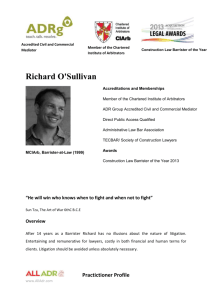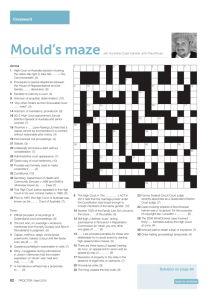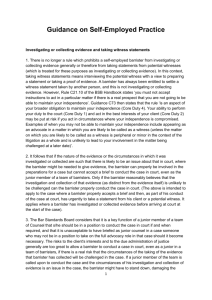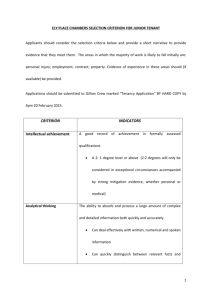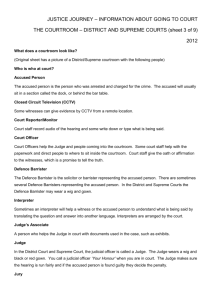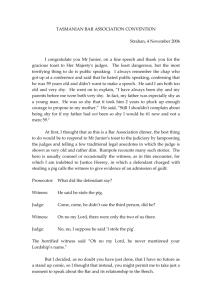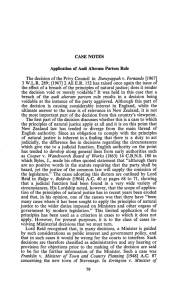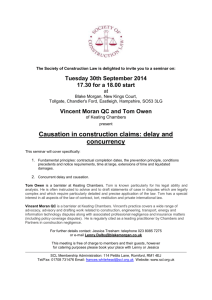Code of Ethics for Barristers - Mauritius Law
advertisement
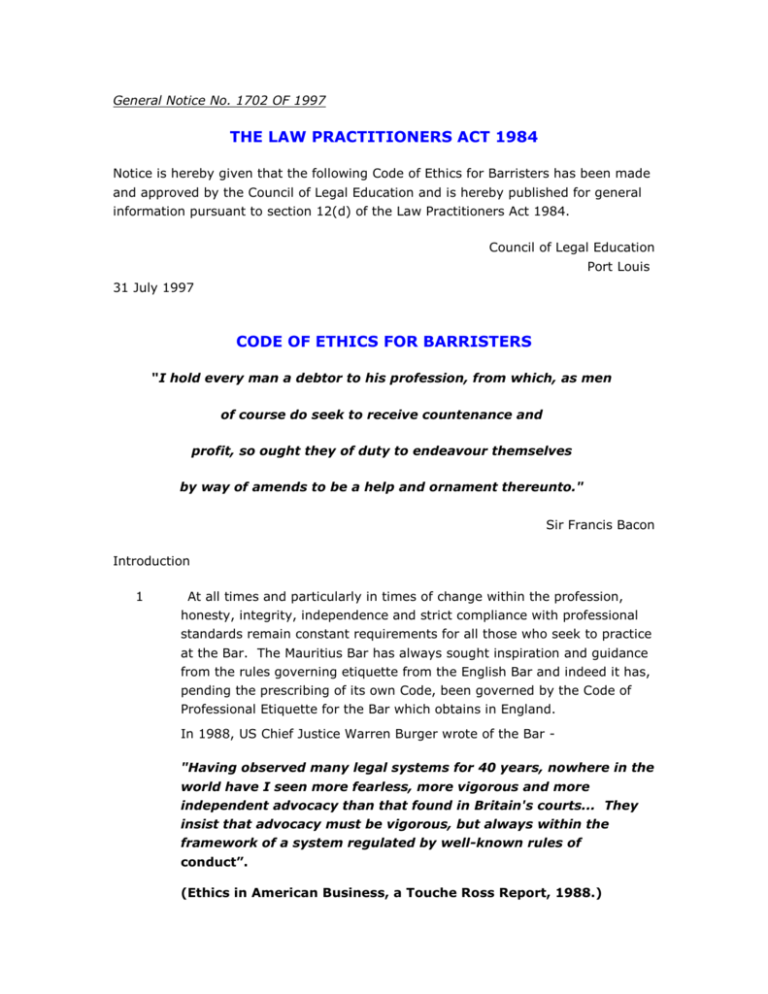
General Notice No. 1702 OF 1997 THE LAW PRACTITIONERS ACT 1984 Notice is hereby given that the following Code of Ethics for Barristers has been made and approved by the Council of Legal Education and is hereby published for general information pursuant to section 12(d) of the Law Practitioners Act 1984. Council of Legal Education Port Louis 31 July 1997 CODE OF ETHICS FOR BARRISTERS "I hold every man a debtor to his profession, from which, as men of course do seek to receive countenance and profit, so ought they of duty to endeavour themselves by way of amends to be a help and ornament thereunto." Sir Francis Bacon Introduction 1 At all times and particularly in times of change within the profession, honesty, integrity, independence and strict compliance with professional standards remain constant requirements for all those who seek to practice at the Bar. The Mauritius Bar has always sought inspiration and guidance from the rules governing etiquette from the English Bar and indeed it has, pending the prescribing of its own Code, been governed by the Code of Professional Etiquette for the Bar which obtains in England. In 1988, US Chief Justice Warren Burger wrote of the Bar "Having observed many legal systems for 40 years, nowhere in the world have I seen more fearless, more vigorous and more independent advocacy than that found in Britain's courts... They insist that advocacy must be vigorous, but always within the framework of a system regulated by well-known rules of conduct”. (Ethics in American Business, a Touche Ross Report, 1988.) Observance of the provisions of the Code is not confined to the inside of the actual court room; it extends to all aspects of work of a barrister. 2 While the code sets out the main obligations enshrined in good professional conduct it is not exhaustive. It sets out the minimum requirements to be observed. Where it is silent on any particular problem the Bar must apply the spirit and intention behind the Code. In cases of doubt it is good to seek guidance from the Bar Council, from a senior colleague whose judgment one trusts, from other counsel at Court, or the judge. 3 Any breach of the Code constitutes professional misconduct and will render the barrister liable to disciplinary proceedings. This must be the obvious consequence of a violation of the ethics of the profession. The respect and trust of peers is priceless. It is good to bear in mind that a reputation for underhandedness will remain with any barrister throughout his career. 4 Every counsel has a duty to his client fearlessly to raise every issue, advance every argument and ask every question, however distasteful, which he thinks will help his client's case. He has also an overriding duty to the Court, to the standards of his profession and to the public, which may and often does lead to a conflict with his client’s wishes or with what the client thinks are his personal interests. He has a duty to the Court which is paramount. It is a mistake to suppose that he is the mouthpiece of his client to say what he wants or his tool to do what he directs. He must not consciously misstate the facts. He must not knowingly conceal the truth. He must not unjustly make a charge of fraud that is without evidence to support it. He must produce all the relevant authorities, even those that are against him. He must see that his client discloses, if ordered, the relevant documents, even those that are fatal to his case. He must disregard the most specific instructions of his client, if they conflict with his duty to the Court. The code which requires a barrister to do all this is not a code of law. It is a code of honour. I. PREAMBLE 1 The function of the Barrister in Society 1.1 In a society founded on respect for the rule of law the barrister fulfills a special role. His duties do not begin and end with the faithful performance of what he is instructed to do so far as the law permits. He must serve the interest of justice as well as those whose rights and liberties he is entrusted to assert and defend. It is his duty only to represent his client but to be his adviser. 1.2 A barrister’s functions impose on him a variety of legal and moral obligations towards (a) the client; (b) the Courts and other authorities before whom he represents his client or acts on his behalf; (c) the legal profession in general and each fellow member of it in particular; and (d) the public for whom the existence of a free and independent profession bound together by respect for rules is an essential means of safeguarding human rights and other interests in society. 2 Purpose and application of the Code 2.1 Rules of professional conduct are designed to ensure the proper performance by the barrister of a function which is recognised as essential in all civilised societies. Failure to observe these rules will render the barrister liable to disciplinary proceedings. 2.2 The purpose of this Code is to provide for those who have been called to the Mauritian Bar the standards of conduct which are appropriate in Mauritius and in particular - (a) in relation to barristers in independent practice, to provide common and enforceable requirements and prohibitions which together preserve and enhance the strength and competitiveness of the independent Bar as a whole in the public interest by requiring such barristers (i) to be completely independent in conductand in professional standing as sole practitioners; (ii)exc ept where otherwise provided bystatute, to act in civil and commercial cases only when instructed byattorneys-at-law; (iii) toacknowledge a public obligation based on the paramount need for access to justice to act for any client (whether legally aided or not) in cases within his field of practice; (b) in relation to persons who after being called to the Bar are employed, to make appropriately similar provision, as is specified in subparagraph (a), taking into account the fact that such persons are employed to provide legal services to and may therefore act only on behalf of their employer; barristers in employment shall not act for and on behalf of the clients of their employer or any other person; (c) in relation to a barrister who, as Director of Public Prosecutions or a Law Officer of the State, is deemed to be a barrister in independent practice although he does not hold himself out to the public generally as willing to render legal services to clients, to make similar provision, subject to such adaptations and modifications as are necessary, as is specified in subparagraph (a) above. 2.3 This Code applies to all barristers practising in Mauritius. 2.4 A barrister shall not - (a) engage in conduct, whether in the pursuit of his profession or otherwise which is(i) dishonest or otherwise discreditable to a barrister; (i) prejudicial to the administration of justice; or (iii) likely to diminish public confidence in the legal profession or the administration of justice or otherwise bring the legal profession into disrepute; (b) engage directly or indirectly in any occupation if his association with that occupation may adversely affect the reputation of the Bar or in the case of a practising barrister his ability to attend properly to the interests of his clients; (c) act directly or indirectly in the capacity of an attorney-at-law, notary, actuary, engineer, insurance broker, architect, auctioneer or estate agent, a patent or trademark agent, a chartered or professional accountant, a consulting engineer, surveyor or land agent, a doctor or dentist, a tax consultant (save as regards advice and construction of fiscal laws), judge's clerk, barrister's clerk or clerk or any employee of any person acting in any of the above capacities. II. GENERAL PRINCIPLES 3. Independence of the Barrister and the Cab-Rank Principle 3.1 The many duties to which a barrister is subject require his absolute independence, free from all other influence, especially such as may arise from his personal interests or external pressure; such independence as is necessary to create trust in the process of justice as the impartiality of the judge. A barrister shall, therefore, avoid any impairment of his independence and be careful not to compromise his professional standards in order to please his client, the Court or third parties. 3.2 This independence is necessary in non-contentious matters as well as in litigation. Advice given by a barrister to his client only to ingratiate himself to serve his personal interests or in response to outside pressure, constitutes a breach of duty not only to his client but also to the interests of justice. 3.3 A barrister in independent practice shall make his practice in Mauritius his primary occupation and shall hold himself out as being willing at all times, in return for the payment of appropriate fees, to render legal services to the public generally in relation to work appropriate to his rank and seniority. 3.4 Subject to paragraph 4, a barrister in independent practice shall, in any field in which he professes to practice and irrespective of whether his client is paying privately or is legally aided or otherwise publicly funded (a) accept any brief to appear before a Court in which he professes to practise; (b) accept any instructions; and (c) act for any person on whose behalf he is briefed or instructed. 3.5 A barrister in independent practice mentioned in paragraph 3.4 shall do so irrespective of (a) the party on whose behalf he is briefed or instructed; (b) the nature of the case; (c) any belief or opinion which he may have formed as to the character, reputation, conduct, guilt or innocence of that person; and (d) race, ethnic origin, sex, sexual orientation, marital status, disability, religion or political persuasion. 3.6 A barrister in independent practice, whether or not he is acting for a fee, may supply legal services in civil or commercial matters only if he is briefed or instructed by an attorney-at-law, provided that such a barrister may without the intervention of an attorney-at-law, accept a brief or instructions with or without fee, directly from and represent another barrister with the consent of the litigant. 3.7 A barrister in independent practice may accept a brief or instructions on terms that payment of fees shall be postponed or shall depend upon or be related to the outcome of the work performed provided that such contingency fees do not exceed 10% (ten per cent) of the sum of the value of the result obtained by the client, whether such result is obtained through a judgment, award or negotiations. 3.8 A practising barrister shall be individually and personally responsible for his own conduct and for his professional work; he shall exercise his own personal judgment in all his professional activities and shall not, if he is a barrister in independent practice, delegate such responsibility to another barrister or agree to assume responsibility for the professional work of another barrister, without the consent of the client and without first making sure that whoever appears eventually is fully briefed and is competent to appear. 3.9 A practising barrister shall - (a) promote and protect fearlessly and by all proper and lawful means his client's best interests and do so without regard to his own interests or to any consequences to himself or to any other person (including his instructing attorney-at-law or fellow members of the legal profession); and (b) acts towards his client and his instructing attorney-at-law at all times in good faith. 3.10 A practising barrister has an overriding duty to the Court to ensure in the public interest that the proper and efficient administration of justice is achieved. He shall assist the Court in the administration of justice and shall not deceive or knowingly or recklessly mislead the Court. 3.11 A practising barrister shall not – (a) permit his absolute independence and freedom from external pressures to be compromised; (b) do anything (for example accept a present even from third parties) in such circumstances as may lead to any inference that his independence may be compromised or undermined in any way; (c) compromise his professional standards in order to please his client, the Court or a third party. 3.12 A practising barrister shall not give a commission or present or lend any money for any professional purpose to any person entitled to instruct him. 3.13 An employed barrister is a barrister who is engaged to provide legal advice or services either for his employer under a contract of employment or by virtue of an office. A barrister who is neither a practicing barrister nor an employed barrister is a non-practising barrister. The provisions of this Code apply also to employed barristers. 3.14 An employed or non-practising barrister shall not, without the permission of the Bar Council, act as judge's clerk or barrister's clerk, or in any capacity whereby directly or indirectly he supplies legal advice or services to the public or a section of the public. 3.15 Notwithstanding the provisions of paragraph 3.14, a barrister who is an employee of a firm or company may supply legal advice or services to his employer or to a holding, subsidiary or associated company of his employer, provided that - (a) He does not himself supply legal advice or services to the public or a section of the public; and (b) the firm or company is not wholly or in part a device whereby the barrister himself (with or without others) is intended directly or indirectly to supply legal advice or services to the public or a section of the public. 3.16 For the purposes of paragraphs 3.14 and 3.15, lecturing, teaching and the writing of legal text-books and of articles in newspapers or journals shall not be considered to be the supply of legal advice or services to the public. 3.17 Neither an employed barrister nor a non-practising barrister shall appear before a Court as counsel. 3.18 (a) An employed barrister may- appear before a Court on behalf of his employer in his capacity as legallyqualified employee or as a legally-qualified holder of an office; (b) draft and sign such documents as may be needed for the purposes of any case in which he is to appear before a Court on behalf of his employer as a legallyqualified holder of an office; (c) where employed by a company, appear in the like capacity and draft documents on behalf of a holding, subsidiary or associated company of his employing company. 4. Exceptions to the Cab-Rank Principle 4.1 A practising barrister shall not accept any brief or instructions if to do so would cause him to be professionally embarrassed and for this purpose a barrister shall be professionally embarrassed where (a) he lacks sufficient experience or competence to handle the matter; (b) having regard to his other professional commitments, he is likely to be unable to do, or will not easily have adequate time and opportunity to prepare, that which he is required to do; (c) the brief or instructions seek to limit his ordinary authority or discretion in the conduct of proceedings in Court; (d) the matter is one in which he has reason to believe that he is likely to be a witness or in which, whether by reason of any connection of his with the client or with the Court or a member of it or otherwise, it will be difficult for him to maintain professional independence or the administration of jus rice might be or appear to be prejudiced; (e) there is or appears to be some conflict or a significant risk of some conflict either between his interests and those of some other person or between the interests of any of one or more of his clients; (f) the matter is one in which there may be a risk of a breach of confidence entrusted to him in his professional capacity by another client or any other person or where the knowledge which he possesses of the affairs of another client is likely to give an undue advantage to the new client. 4.2 A barrister shall refrain from appearing before a Judge or Magistrate to whom he is related by blood up to the degree of first cousin or by marriage, provided that it is understood, however, that the person responsible for the allocation of cases before a Judge or Magistrate shall ensure in the first place that no case is allotted to the Judge or Magistrate who is so related to the barrister. 4.3 A barrister shall at all times be conscious of the likelihood of actual or potential conflicts of interests, and where such likelihood exists, he shall refuse or return the instructions or brief. Where any doubt exists, he shall promptly seek the written opinion of the Bar Council. 5. Confidentiality 5.1 It is of the essence of a barrister's function that he should be told by his client things which the client would not tell to others, and that he shall be the recipient of other information on a basis of confidence. Without the certainty of confidentiality, there cannot be trust. Confidentiality is, therefore, a primary and fundamental right and duty of the barrister. 5.2 A barrister shall respect the confidentiality of all information given to him by his client, or received by him about his client or others in the course of rendering professional services to his client. 5.3 The obligation of confidentiality shall not be limited in time. 6. Incompatible Occupations 6.1 In order to perform his functions with due independence and in a manner which is consistent with his duty to participate in the administration of justice, a barrister shall be excluded from occupations of a commercial nature as well as those where, in any gainful occupation, he is likely to have to accept orders and directives from persons who do not belong to the profession. 6.2 A barrister may, in relation to family-owned companies, be involved in their management (but not in their business) provided that his involvement is not likely to be adverse to the reputation of his profession. 7. Personal Publicity 7.1 A barrister shall not advertise or seek personal publicity. He may, however, cause advertisements to be inserted in specialised publications or circulate pamphlets to a restricted class of persons. The Bar Council may order a barrister to remove any such advertisements or pamphlets where it considers them to cause embarrassment to the legal profession. 7.2 A barrister shall not do or cause or allow to be done on his behalf anything with the primary motive of personal advertisement or anything likely to lead to the reasonable inference that it was so motivated. 7.3 A barrister, other than one who has retired from practice, may not write for publication, broadcast by radio or television, publish in a film or otherwise cause or permit to be published any particulars of any matter on which he has been engaged as Counsel unless he can do so without disclosing confidential information and without giving publicity to his own part in the matter. III. RELATIONS WITH CLIENTS 8. Acceptance of Briefs and Instructions 8.1 A barrister shall not handle a criminal case for a party except on the party's instructions or with the party's consent on the instructions of another barrister who himself acts for the party. He may, however, act in a case in which he has been instructed by another barrister who himself acts for the party. 8.2 A barrister shall not appear, except where otherwise provided by statute, in a civil or commercial case before any Court unless instructed by an attorney-at-law. 8.3 A barrister shall advise and represent his client promptly, conscientiously and diligently. He shall undertake personal responsibility for the discharge of the instructions given to him. He shall keep his client informed as to the progress of the matter entrusted to him. 8.4 A barrister shall not handle a matter which he knows or ought to know he is not competent to handle, without co-operating with another barrister who is competent to handle it. 8.5 A barrister shall not accept instructions unless he can discharge them promptly, having regard to the pressure of other work. 8.6 A barrister shall not be obliged to accept a brief or instructions (a) requiring him to do anything otherwise than during the course of his ordinary working year; (b) otherwise than for a fee which is proper having regard to the complexity, length and difficulty of the case and to his ability, experience and seniority; (c) where the expenses which will be incurred are likely to be unreasonably high in relation to the fee likely to be paid and are not to be paid additionally to such fee; (d) (i) except in the case of legal aid work - unless and until his fees are agreed; (ii) where having required his fees to be paid before he accepts the brief or instructions to which the fees relate, those fees are not paid. 8.7 A barrister shall not be obliged to accept a brief or instructions (a) to settle alone any document of a kind generally settled only by or in conjunction with a junior; (b) 8.8 to act without a junior where he considers that the interests of the client require that a junior be also instructed. A practising barrister shall cease to act and, if he is a barrister in independent practice, shall return any brief or instructions where (a) continuing to act would cause him to be professionally embarrassed within the meaning of paragraph 4, provided that If he would be professionally embarrassed only because it appears to him that he is likely to be a witness on a material question of fact, he may retire or withdraw only if he can do so without jeopardising his client's interests; (b) having accepted a brief or instructions on behalf of more than one client, there is or appears to be – (i) a conflict or a significant risk of a conflict between the interests of anyone or more of such clients or (ii) a risk of a breach of confidence; and the clients do not all consent to his continuing to act; (c) in any legally aided case (whether civil or criminal) it has become apparent to him that legal aid has been wrongly obtained by false or inaccurate information and action to remedy the situation is not immediately taken by his client; (d) the client refuses to authorise him to make some disclosure to the Court which his duty to the Court requires him to make; (e) having become aware during the course of a case of the existence of a document which should have been but has not been disclosed in pleadings, the client fails forthwith to disclose it; (f) having come into possession of a document belonging to another party by some means, other than the normal and proper channels, and having read it before he realises that it ought to have been returned unread to the person entitled to possession of it, he would thereby be embarrassed in the discharge of his duties by his knowledge of the contents of the document provided that he may retire or withdraw only if he can do so without jeopardising his client's interests. 8.9 Subject to paragraph 8.8, a practising barrister may withdraw from a case where he is satisfied that (a) his brief or instructions have been withdrawn; 8.10 (b) his client is not prepared to follow his advice; (c) his professional conduct is being impugned; or (d) there is some other substantial reason for so doing. A practising barrister shall not(a) cease to act or return a brief or instructions without having first explained to his client his reasons for doing so; (b) return a brief or instructions to another barrister without the consent of his instructing attorney-at-law or his client; (c) where he is a barrister in independent practice, return a brief which he has accepted and for which a fixed date has been obtained or (except with the consent of his client and where appropriate the Court) break any other professional engagement so as to enable him to attend a social or nonprofessional engagement; (d) except as provided in paragraph 8.8, return any brief or instructions or withdraw from a case in a way or in such circumstances that his client may be unable to find other legal assistance in time to prevent prejudice being suffered by the client. 9. Conflict of Interest 9.1 Without prejudice to paragraph 8.6, a barrister shall not advise, represent or act on behalf of two or more clients in the same matter if there is a conflict or a significant risk of a conflict between the interests of those clients. He shall, in such a case, cease to act for both clients and he shall further cease to act whenever there is a risk of a breach of confidence or where his independence may be impaired. 9.2 A barrister shall refrain from acting for a new client if there is a risk of 'a breach of confidence placed in him by a former client or if the knowledge which he possesses of the former client would give an undue advantage to the new client. 9.3 Where a barrister has accepted a brief or instructions for any party in any proceedings, he shall not accept a brief or instructions in respect of an appeal or further stage of the proceedings for any other party without obtaining the prior consent of the original client if there may be a risk of a conflict of interest. 9.4 A barrister shall not act as such - (a) In any matter in which he is a party or has a significant pecuniary interest, without prejudice to his right to appear as a litigant in person; (b) either for or against any local authority or organisation of which he is a member; (c) against any company, firm or société of which he is a director, secretary, or officer or in which he has directly a significant pecuniary interest. 9.5 A barrister shall not accept any brief or instructions where the matter is one in which he has reason to believe that he is likely to be a witness. Where, however, having accepted a brief or instructions, it later appears that the barrister is likely to be a witness in the case on a material question of fact, he may only retire or withdraw if he can do so without jeopardising his client's interests. 10. Conduct of Work 10.1 A barrister shall in all his professional activities act promptly, conscientiously, diligently and with reasonable competence and shall take all reasonable and practicable steps to ensure that professional engagements are fulfilled. 10.2 A barrister shall at all times be courteous to the Court and to all those with whom he has professional dealings. 10.3 In relation to instructions to advise or draft documents, a barrister shall ensure that the advice or document is provided within such time as has been agreed with the client, or otherwise within a reasonable time after receipt of the relevant instructions. Where it becomes apparent to the barrister that he will not be able to do the work within that time, he shall inform his client forthwith. 10.4 A barrister shall ensure that advice which he gives is sound, clear, practical and appropriate to the needs and circumstances of the particular client, and clearly and comprehensibly expressed. 10.5 Subject to paragraph 10.6, a barrister shall exercise his own personal judgment upon the substance and purpose of any advice he gives or any document he drafts. He shall not devise facts which will assist in advancing his client's case and shall not draft any pleading, affidavit, statement of case or notice of appeal containing – (a) any statement of fact or contention, as the case may be, which is not supported by his client or by his brief or instructions; (b) any contention which he does not consider to be properly arguable; (c) any allegation of fraud unless he has clear instructions to make such an allegation and has before him reasonably credible material which as it stands establishes a prima facie case of fraud; or (d) in the case of an affidavit, any statement of fact other than the evidence which in substance, according instructions, he reasonably believes the witness would be able to give if the evidence contained in the affidavit were being given viva voce. 10.6 Nothing in paragraph 10.5 shall prevent a barrister drafting a pleading, affidavit or statement of case containing specific facts, matters or contentions included by the barrister, subject to the client’s confirmation as to their accuracy. 10.7 A barrister shal1 be available on reasonable notice for a conference prior to the day of hearing of any case in which he is briefed. Where no such conference takes place, the barrister shall be available for a conference on the day of the hearing. 11. Witnesses and the Barristers' conduct towards the Court 11.1 A barrister shall not rehearse, practise or coach any witness, in relation either to the evidence itself or to the way in which to give it. 11.2 In a civil or commercial case a practising barrister may, even in the absence of his instructing attorney-at-law, discuss the case with a potential witness where he considers that the interests of his client so require. 11.3 A barrister when conducting proceedings in Court (a) shall be personally responsible for the conduct and presentation of his case and shall exercise personal judgment upon the substance and purpose of statements made and questions asked; (b) shall not, unless asked to do so by the Court, assert a personal opinion of the facts or the law; (c) shall ensure that the Court is informed of all relevant decisions and legislative provisions of he is aware, whether the effect is favourable or unfavourable towards the contention for which he argues and shall bring any procedural irregularity to the attention of the Court during the hearing and not reserve such matter to be raised on appeal; (d) shall not, in a civil or commercial case, adduce evidence obtained otherwise than from or through his client or devise facts which will assist in advancing his client's case; (e) shall not make statements or ask questions which are merely scandalous or intended or calculated only to vilify, insult or annoy a witness or some other person; (f) shall, if possible, avoid the naming in open Court of third parties whose character would be impugned; (g) shall not, by assertion in a speech, impugn a witness whom he has had an opportunity to cross-examine unless in crossexamination he has given the witness an opportunity to answer the allegation; (h) shall not suggest that a witness or other person is guilty of crime, fraud, misconduct or attribute to another person the crime or conduct of which his client is accused unless such allegations go to a matter in issue (including the credibility of the witness) which is material to his client's case, and which appears to him to be supported by reasonable grounds; (i) shall not try to mislead or do anything tending to frighten or coerce the witness. 11.4 A barrister shall take all reasonable and practicable steps to avoid unnecessary expense or waste of the Court's time and resources. He shall, when asked, inform the Court of the probable length of his case; and he shall also inform the Court of any developments which might affect any information already provided. 11.5 In Court a barrister's personal appearance shall be decorous, and his dress, when robes are worn, shall be compatible with them. 11.6 Notwithstanding that his instructing attorney-at-law is not present, a practising barrister who has been briefed in a case may, where (a) the attendance of his attorney-at-law has been dispensed with under paragraph 11.7; or (c) he arrives in Court and the attorney-at-law is not in attendance and there are no other grounds on which to request an adjournment and there is no practical alternative, conduct the case on behalf of the client. 11.7 Where he is satisfied that the interests of the client and the interests of justice will not be prejudiced, a practising barrister to whom a brief has been delivered may agree with his instructing attorney that attendance by the latter may be dispensed with for all or part of any hearing. 11.8 Except with the consent of the representative for the opposing side or of the Court, a barrister shall not communicate directly or indirectly with any witness, whether or not the witness is his client, once that witness has begun to give evidence until it has been concluded. 12. Documents 12.1 A barrister shall not obtain or seek to obtain a document, or knowledge of the contents of a document, belonging to another party otherwise than by means of the normal and proper channels for obtaining such document or such knowledge. 12.2 Where a barrister comes into possession of a document belonging to another party by some means, other than the normal and proper channels, (for example, if the document has come into his possession in consequence of a mistake or inadvertence by another person or if the document appears to belong to another party or to be a copy of such document and to be privileged from discovery or otherwise to be one which ought not to be in the possession of his instructing attorney-at-law or client) he shall(a) where appropriate, make enquiries of his instructing attorney-at-law in order to ascertain the circumstances in which the document was obtained; and (b) unless satisfied that the document has been properly obtained in the ordinary course of events, at once return the document unread to the person entitled to possession of it. 12.3 Where a barrister has come into possession of the document mentioned in paragraph 12.2 and read it before he realizes that he ought not to, and is likely to be embarrassed in the discharge of his duties by his knowledge of the contents of the document, he shall, provided he can do so without prejudice to his client, return his brief or instructions and explain to his instructing attorney-at-law and his client why he does so. 12.4 Where however, to return his brief or instructions is likely to prejudice his client (for example, by reason of the proximity of the trial) he shall not return his brief or instructions and shall, unless the Court otherwise orders, make such use of the document as will be in his client's interests. He shall inform his opponent of his knowledge of the document and of the circumstances, so far as known to him, in which the document was obtained and of his intention to use it. In the event of objection to the use of such document, it is for the Court to determine what use, if any, may be made of it. 12.5 Where during the course of a case a barrister becomes aware of the existence of a document which ought to have been but has not been disclosed, he shall advise his instructing attorney-at-law to disclose it forthwith and if it is not disclosed, he shall withdraw from the case. IV. STANDARDS APPLICABLE TO CRIMINAL CASES 13. Responsibilities of Prosecuting Counsel 13.1 Prosecuting Counsel shall not attempt to obtain a conviction by all means at his command. He shall not regard himself as appearing for a party. He shall lay before the Court fairly and impartially the whole of the facts which comprise the case for the prosecution and shall assist the Court on all matters of law applicable to the case. 13.2 Prosecuting Counsel shall bear in mind at all times whilst he is instructed that he is responsible for the presentation and general conduct of the case and that it is his duty to ensure that all relevant evidence is either presented by the prosecution or made available to the defence and that it is not part of his duty to secure a conviction at all costs. 13.3 Except in exceptional circumstances, prosecuting Counsel shall not (a) see or confer with prosecution witnesses in the case unless they have discharged some supervisory responsibility in the investigation; (b) confer with investigators or receive factual instructions directly from them on matters about which there is or may be a dispute. 13.4 It is the duty of prosecuting counsel to assist the Court at the conclusion of the summing-up by drawing intention to any apparent errors or omissions of fact or law. 13.5 In relation to sentence, prosecuting counsel shall(a) not attempt by advocacy to influence the Court with regard to sentence; where, however, an accused party is unrepresented, it is proper to inform the Court of any mitigating circumstances about which Counsel is instructed; (b) be in a position to assist the Court, if requested, as to any statutory provisions relevant to the offence or the offender and as to any relevant guidelines as to sentence laid down by the superior Courts; (c) bring any such matters as are referred to in subparagraph (b) above to the attention of the Court; (d) draw the attention of the defence to any assertion of material fact made in mitigation which the prosecution believes to be untrue; where the defence persists in that assertion, prosecuting counsel shall invite the Court to consider requiring the issue to be determined by the calling of evidence 14. Responsibilities of Defence Counsel 14.1 When defending a client on a criminal charge, a barrister shall endeavour to protect his client from conviction otherwise than by a competent Court and upon legal evidence sufficient to support a conviction for the offence charged. 14.2 A barrister acting for the defence shall(a) satisfy himself, where he is briefed to represent more than one accused party, that no conflict of interest is likely to arise; (b) arrange a conference and, if necessary, a series of conferences with his client; (c) as soon as possible, consider whether any enquiries or further enquiries are necessary; (d) consider whether any witnesses for the defence are required and, if so, which; (e) consider whether it would be appropriate to call expert evidence for the defence; (f) ensure that he has sufficient instructions for the purpose of deciding which prosecution witnesses should be crossexamined. 14.3 A barrister acting for an accused party shall advise his client generally about his plea. In doing so he may, if necessary, express his advice in strong terms. He shall, however, make it clear that the client has complete freedom of choice and that the responsibility for the plea is the client's. 14.4 A barrister acting for an accused party shall advise his client as to whether or not to give evidence in his own defence but the decision must be taken by the client himself. 14.5 Where an accused party tells his Counsel that he did not commit the offence with which he is charged but nevertheless insists on pleading guilty to it for reasons of his own, Counsel shall continue to represent him, but only after he has advised what the consequences will be and that what can be submitted in mitigation can only be on the basis that the client is guilty. 14.6 Where some procedural irregularity comes to the knowledge of Defence Counsel before the verdict is returned, he shall inform the Court as soon as practicable and shall not wait with a view to raising the matter later on appeal. Defence Counsel shall not draw matters of fact or law to the attention of the Court at the conclusion of the summing-up, but he may do so if he believes it would be to the advantage of his client. 14.7 Defence Counsel has no duty to advise his client to disclose a previous conviction. Where the Court has been led by the prosecution to believe that an accused has no previous convictions, Defence Counsel shall not disclose facts to the contrary which are known to him, nor correct any information given by the prosecution if such disclosure or correction would be to his client's detriment. Defence Counsel shall, however, take care not to lend himself to any assertion that his client has no convictions, or to ask a prosecution witness whether there are previous convictions against his client, in the hope that he will receive a negative answer. 14.8 Where an accused person instructs his Counsel that he is not guilty of the offence with which he is charged but decides not to give evidence himself, his Counsel shall put his defence before the Court and, if necessary, make positive suggestions to witnesses. 14.9 Defence Counsel shall not, in a plea in mitigation, make any allegation which is merely scandalous or calculated to vilify or insult any person. In any case, the naming in open court of third parties, whose character is likely to be impugned, shall, if possible, be avoided. Where necessary, names, addresses or other such details shall be written down and handed in to the Court. 14.10 In normal circumstances Defence Counsel shall see his client after conviction and sentence, or where he is unable to do so, ensure that it is done as soon as practicable. 15. Confessions of guilt 15.1 In considering the duty of Counsel retained to defend a person charged with an offence who confesses to his Counsel that he did commit the offence charged, it is essential for him to bear the following points clearly in mind (a) that every punishable crime is a breach of common or statute law committed by a person of sound mind and understanding; (b) the issue in a criminal trial is always whether the accused is guilty of the offence charged, never whether he is innocent; (c) 15.2 that the burden of proof rests on the prosecution. It follows that the mere fact that a person charged with a crime has confessed to his Counsel that he did commit the offence charged is no bar to his Counsel appearing or continuing to appear in his defence, nor indeed does such a confession release Counsel from his imperative duty to do all that he honourably can for his client. 15.3 Such a confession, however, imposes very strict limitations on the conduct of the defence. Counsel shall not assert as true that which he knows to be false. He shall not connive at, much less attempt to substantiate, a fraud. 15.4 While, therefore, Defence Counsel may take any objection to the competency of the Court, to the form of the information, to the admissibility of any evidence or to the evidence admitted, he shall not suggest that some other person had committed the offence charged, or call any evidence which he knows to be false, having regard to the confession, such as, for instance, evidence in support of an alibi. In other words, Defence Counsel shall not (whether by calling the accused or otherwise) set up an affirmative case inconsistent with the confession made to him. 15.5 Defence Counsel shall decide within what limits he may attack the evidence for the prosecution either by cross-examination or in his speech to the Court charged with the determination of the facts. Counsel may test the evidence given by each individual witness and argue that the evidence taken as a whole is insufficient to amount to proof that the accused is guilty of the offence charged. Further than this he shall not go. 15.6 The foregoing is based on the assumption that the accused has made a clear confession that he did commit the offence charged, and does not profess to deal with the very difficult questions which may present themselves to a Defence Counsel when a series of inconsistent statements are made to him by the accused before or during the proceedings; nor does it deal with the questions which may arise where statements are made by the accused which point almost irresistibly to the conclusion that the accused is guilty but do not amount to a clear confession. Statements of this kind may inhibit the defence, but questions arising on them can only be answered after careful consideration of the actual circumstances of the particular case. 15.7 A Defence Counsel shall bring to such situations his professional integrity, competence and he must always strive to perform his duty with fairness having due regard to the administration of justice. 16. General 16.1 Both Prosecuting and Defence Counsel shall (a) ensure that the Court receives in good time their best estimate of the likely length of the trial (including whether or not there is to be a plea of guilty) and that the Court is given early notice of any change of such estimate or possible adjournment; (b) take all reasonable and practicable steps to ensure that the case is properly prepared and ready for trial by the time that it is first listed; (c) ensure that arrangements have been made in adequate time for witnesses to attend Court as and when required and plan, so far as possible, for sufficient witnesses to be available to occupy the full Court day; (d) where a witness (for example a doctor) can only attend Court at a certain time during the trial without great inconvenience to himself, try to arrange for that witness to be accommodated by raising the matter with the Court and with his opponent. 17. Attendance of Counsel at Court 17.1 Prosecuting Counsel shall be present throughout the trial, including, in the case of a trial before the Assizes, the summing-up and the return of the jury. He may not absent himself without leave of the Court. Where two or more barristers appear for the prosecution, however, the attendance of one is sufficient. 17.2 Defence Counsel shall ensure that the accused is never left unrepresented at any stage of his trial 17.3 Where an accused is represented by one barrister, that barrister shall normally be present throughout the trial and shall only absent himself in exceptional circumstances which he could not reasonably foresee and provided that (a) he has obtained the consent of the client and the Court; and (b) a competent deputy takes his place; or (c) his client is not concerned with a voir dire which takes place within the trial and which is isolated from the issues flowing from the information as far as the specific interests of his client are concerned. 17.4 Where an accused is represented by two barristers, neither may absent himself except for good reason and then only after the consent of the client has been obtained. 17.5 In lengthy trials involving numerous accused parties, where Counsel is satisfied that during a specific part of the trial there is no serious possibility that events will occur which will relate to his client, he may, with the consent of the client, absent himself for that part of the trial, after so informing the Court. In this event it is his duty (a) to arrange for other Counsel appearing for the other accused to guard the interests of his client; (b) to keep himself informed throughout of the progress of the trial and, in particular, of any development which could affect his client; and (c) not to accept any other commitment which would render it impracticable for him to make himself available at reasonable notice if the interests of his client so require. 18. Appeals 18.1 Where his client pleads guilty or is convicted, Defence Counsel shall, if so requested, see his client after he has been sentenced and express orally any provisional view he may have formed as to the prospects of a successful appeal. 18.2 Counsel shall not settle grounds of appeal unless he considers that such grounds are properly arguable 18.3 Grounds of appeal shall be settled with sufficient particularity to enable the opposing party and subsequently the Court to identify clearly the matters relied upon. Where at any stage Counsel is of the view that the appeal ought to be abandoned, he shall at once set out his reasons in writing and send them to his instructing attorney and the client. V. FEES 19. Regulation of fees 19.1 A fee charged by a barrister shall be fully disclosed to his client and shall be fair and reasonable. A barrister shall not allow third party not attached to his Chambers to charge and/or collect fees on his behalf. 19.2 A barrister in independent practice may charge for any work undertaken by him (whether or not it involves an appearance in Court) on any basis or by any method he thinks fit which does not infringe the other provisions of this Code provided that he may accept a brief to conduct a list of cases in any Court on the basis of a single agreed fee. 19.3 A barrister in independent practice who receives fees in respect of work done by another barrister shall himself and without delegating the responsibility to anyone else, forthwith pay the whole of the fee in respect of that work to that other barrister. 19.4 A barrister in independent practice who arranges for another barrister to undertake work on his behalf (other than a person who has asked to do the work in order to increase his own skill or experience) shall himself and without delegating the responsibility to anyone else (a) pay proper financial remuneration for the work done; (b) make payment within a reasonable time and, if possible, within three months after the work has been done, unless otherwise agreed in advance with the other barrister. 20. Payment on Account 20.1 Where a barrister requires a payment on account of his fees and/or disbursements, the payment shall not exceed reasonable estimate of the fees and probable disbursements involved. 20.2 Failing such payment, a barrister may withdraw from the case or refuse to handle it, but subject always to his duties enshrined in this Code. 21. 21.1 Fee Sharing with Persons Other than Barristers A barrister shall not share his fees with any person other than a barrister. 22. Legal Aid 22.1 A barrister shall inform his client of the availability of legal aid where applicable. 22.2 A barrister appointed to act in forma pauperis shall not ask or accept any remuneration or payment in kind under whatever form from the client. 23. Client Funds 23.1 A barrister shall never ask or accept to receive payment of any sum of money for or on behalf of his client. 24. Referral Fees 24.1 A barrister may not demand or accept from any other person, including another barrister ,a fee, commission or any other compensation for referring or recommending a client. 24.2 A barrister shall not pay to any person a fee, commission or any other compensation as a consideration for referring a client to himself. VI. RELATIONS WITH THE COURTS 25. Fair Conduct of Proceedings 25.1 A barrister shall always have due regard for the fair conduct of proceedings. He shall not, for example, make contact with the judge without first informing the barrister acting for the opposing party or submit exhibits, notes or documents to the judge without communicating them in good time to the barrister on the other side unless such steps are permitted under the relevant rules of procedure. 26. Demeanour in Court 26.1 A barrister shall, while maintaining due respect and courtesy towards the Court, defend the interest of his client honourably and in a way which he considers will be to the client's best advantage within the limits of the law. 26.2 A barrister shall always in Court or in the precincts of the Court behave honourably, with dignity and respect to the Court, its officers, witnesses and the public at large. 27. False or Misleading Information 27.1 A barrister shall never knowingly give false or misleading information to the Court. 28. Extension to Arbitrators etc. 28.1 The rules governing a barrister's relations with the Courts apply also to his relations with arbitrators and any other persons exercising judicial or quasi-judicial functions, even on an occasional basis. 29. Communication with Opposing Parties 29.1 A barrister shall not communicate about a particular case or matter directly with any person whom he knows to be represented or advised in the case or matter by another law practitioner, without the consent of that other law practitioner whom he shall keep informed of any such communications. 30. 30.1 Change of Barrister A barrister who is instructed to represent a client in substitution for another barrister in relation to a particular matter shall inform that other barrister and, subject to paragraph 30.2 below, shall not begin to act until he has ascertained that arrangements have been made for the settlement of the other barrister's fees and disbursements. This duty does not, however, make the new barrister personally responsible for the former barrister's fees and disbursements. 30.2 Where urgent steps have to be taken in the interests of the client before the conditions in paragraph 30.1 above can be complied with, the barrister may take such steps provided he informs the other barristers as soon as is reasonably practicable. 31. Training Young Pupils 31.1 In order to improve trust and co-operation amongst barristers for the client's benefit, there is a need to encourage a better knowledge of the laws and procedures. When considering the need for the profession to give good training to their young pupils, barristers shall take into account the need to give as wide a training as possible to them. 32. Disputes Amongst Barristers 32.1 Where a barrister considers that a colleague has acted in breach of a rule of professional conduct, he shall draw the matter to the attention of his colleague. 32.2 Where any personal dispute of a professional nature arises amongst barristers, they shall, if possible, first try to settle it in a friendly way. 32.3 A barrister shall not commence any form of proceedings against a colleague on matters referred to above without first informing the Bar Council so that the latter might have an opportunity to assist in reaching a settlement. VII - COMMENCEMENT 33. Commencement This Code shall come into operation on 1 January 1998.
